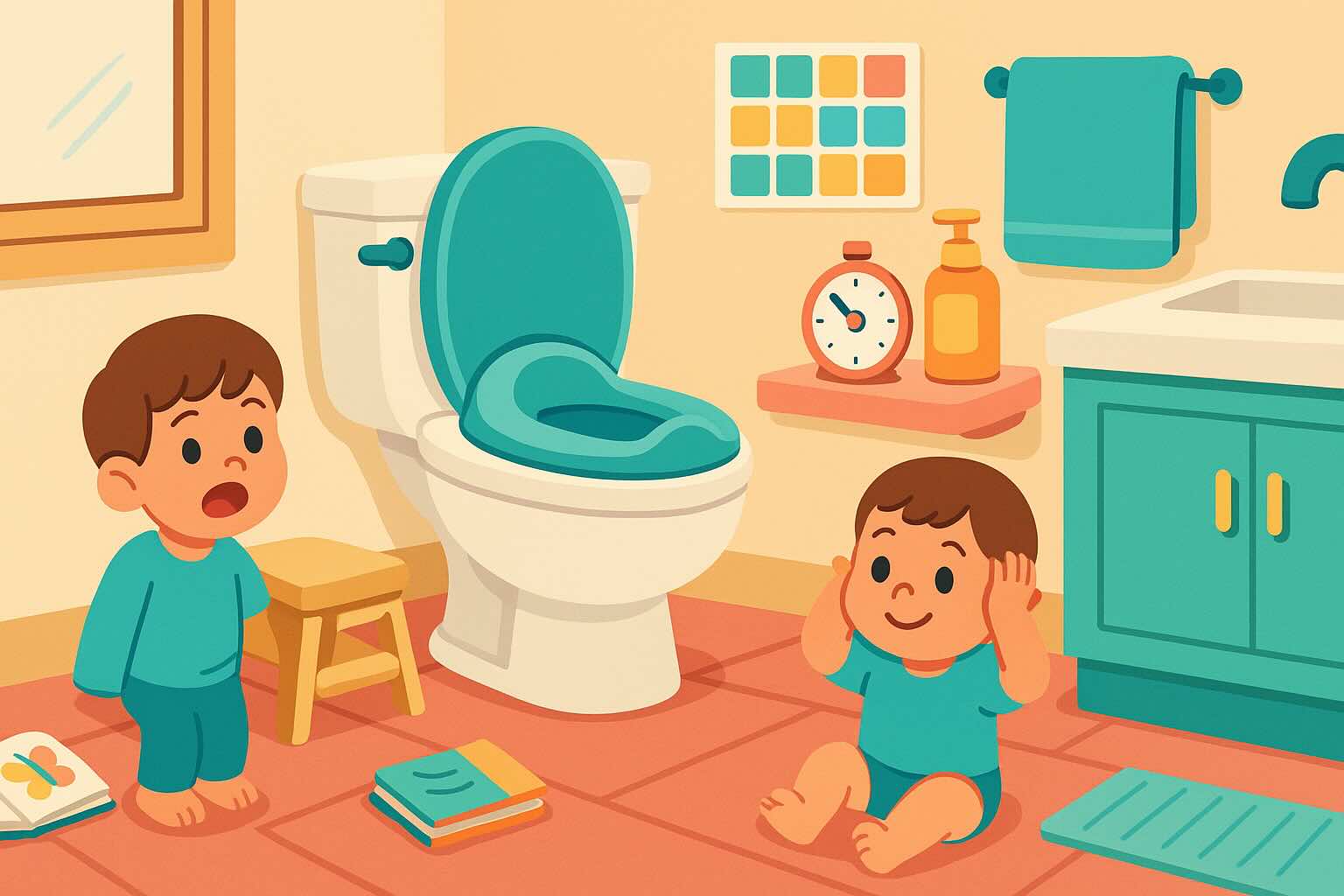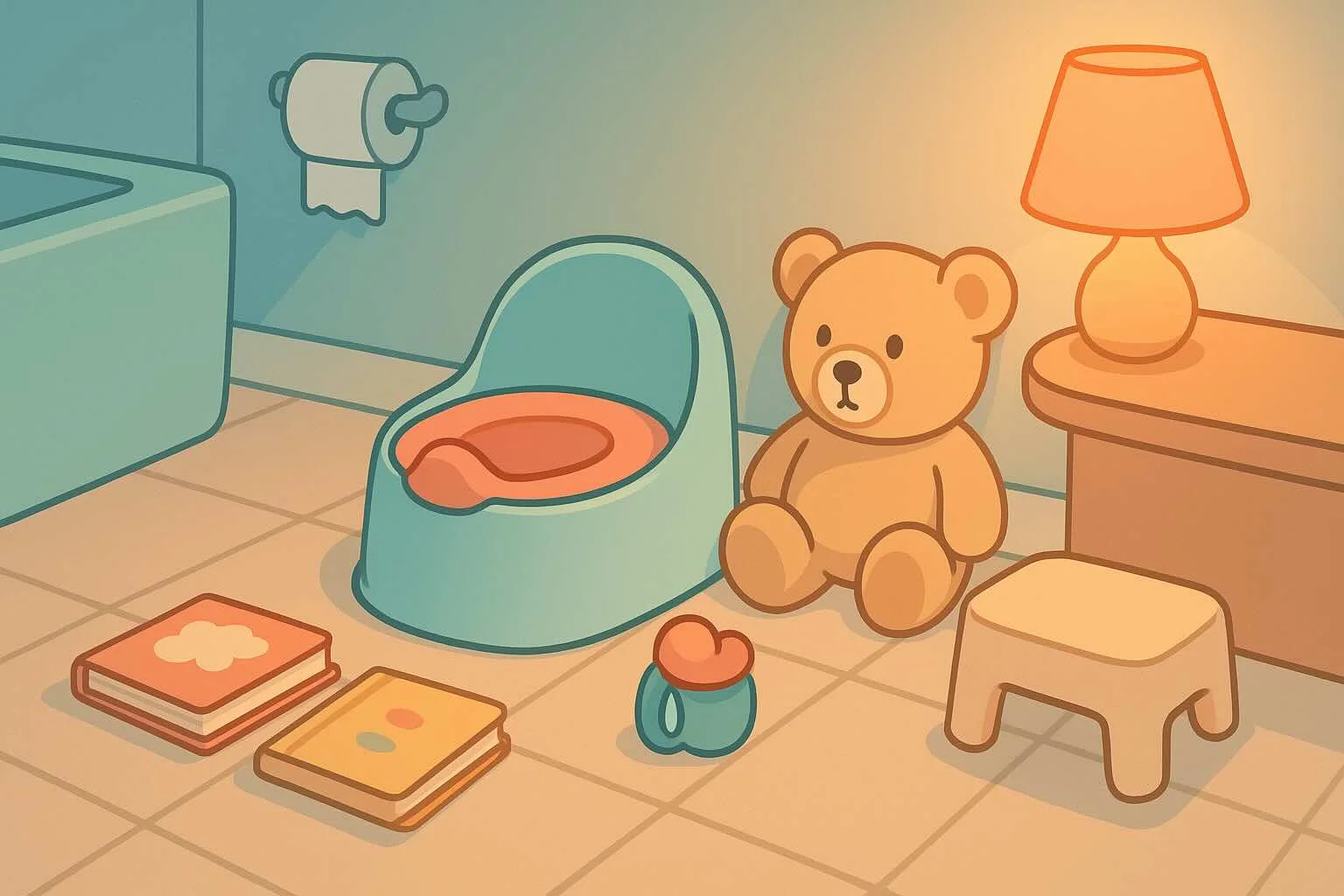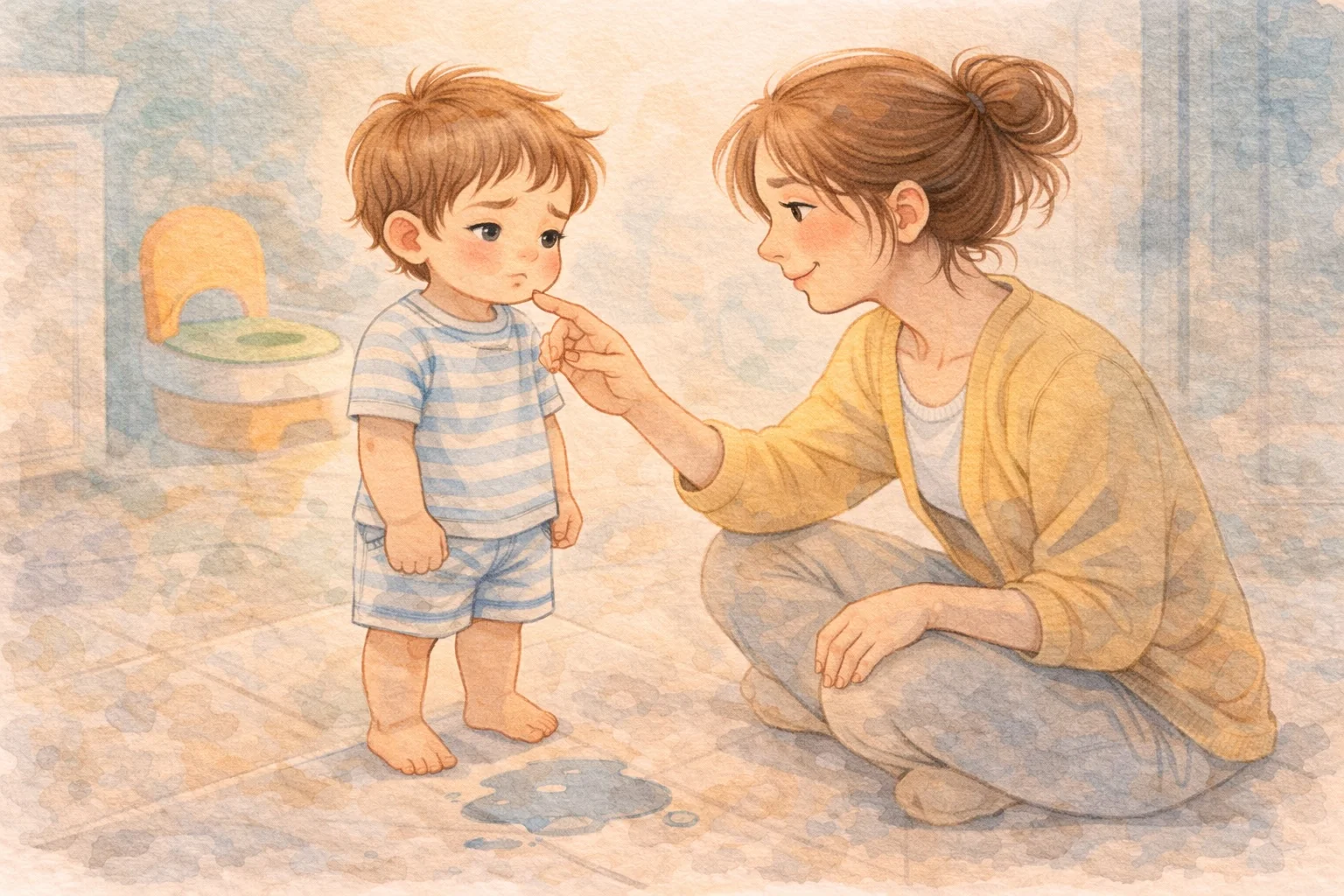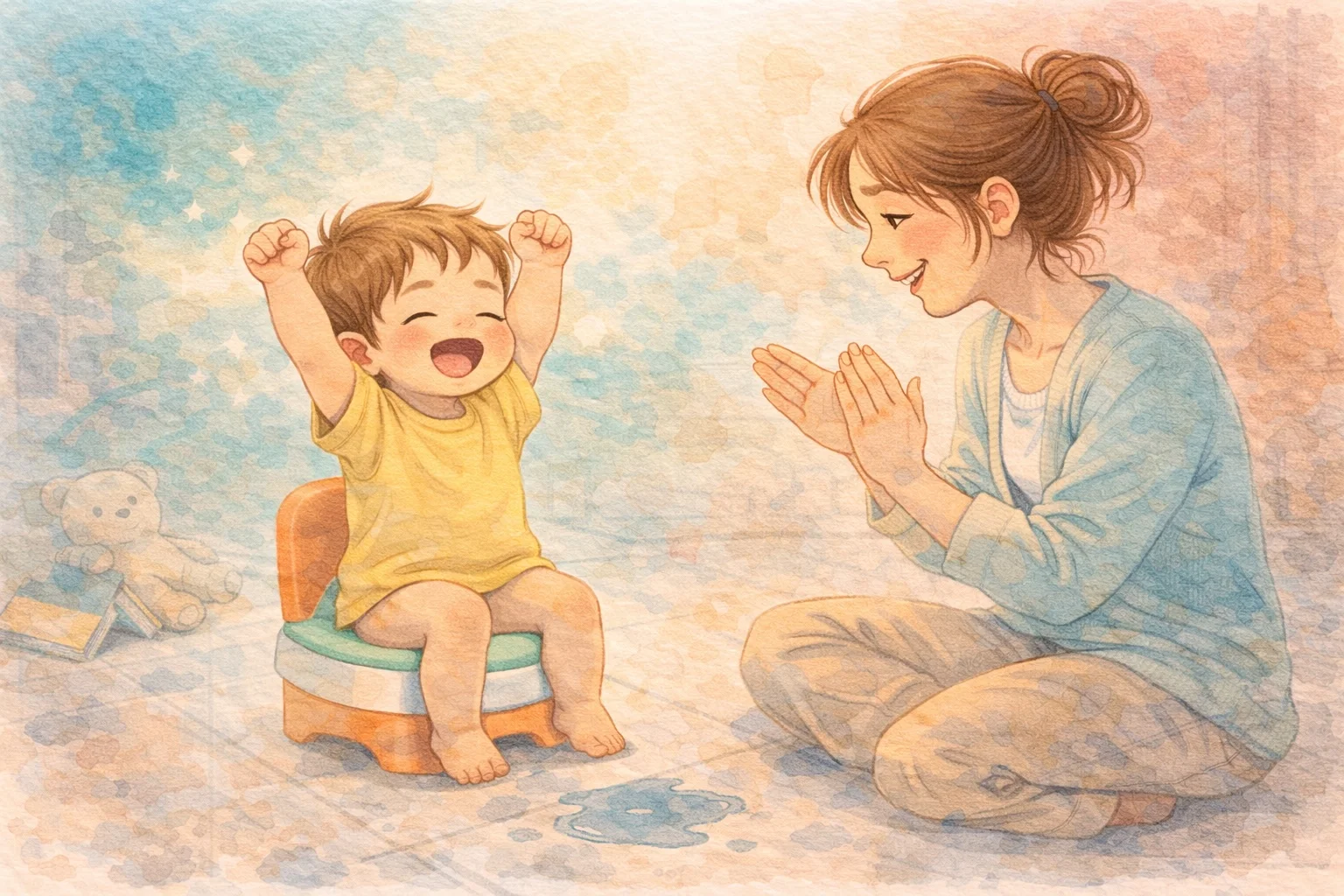3 Year Old Potty Training: Turning Power Struggles into Independence


"I know she can do it. She's peed on the potty successfully at least 20 times! But now she flat-out refuses. This morning she looked me dead in the eye, said 'No potty,' and then peed in her diaper 30 seconds later. I don't get it—she knows how, she's capable, so why won't she just do it?!"
Welcome to age 3, where your child's most powerful developmental drive isn't learning new skills—it's asserting control over their own body and choices.
The potty refusal isn't defiance. It's not regression. It's not stubbornness (well, technically it is, but that's a feature of healthy development, not a bug).
It's your 3-year-old's brain doing exactly what it's supposed to do: separating from you, establishing autonomy, and declaring "I'm in charge of me."
And here's the paradox that unlocks 3-year-old potty training: the more you try to make them use the potty, the more their brain needs to prove they're in control by refusing.
In this guide, you'll learn:
- Why 3-year-olds refuse the potty (and why it's developmental, not defiance)
- The "You're in charge of your body" framework that ends power struggles
- How to leverage their natural independence drive instead of fighting it
- Handling preschool pressure without triggering resistance
- When to offer support vs. when to step completely back
- Preparing for preschool without battles
Let's start with what makes 3-year-old potty learning so different from other ages.
- ✓Your 3-year-old's potty refusal is driven by healthy autonomy development, not defiance
- ✓The body autonomy approach — "You're in charge of your body" — ends power struggles by removing your agenda
- ✓Stop all reminders, prompts, and praise; respond neutrally to both potty use and accidents
- ✓Most 3-year-olds choose the potty independently within 2-8 weeks once control is genuinely transferred
- ✓The less you push, the faster they choose it themselves
The 3-Year-Old Power Dynamic: Why "Ready" Doesn't Mean "Willing"
Here's the frustrating reality parents face with 3-year-olds:
Physical readiness: ✅ Their bladder can hold pee for 2+ hours Cognitive readiness: ✅ They understand cause and effect Motor skills: ✅ They can pull down pants and sit on potty Communication: ✅ They can tell you they need to go
And yet: ❌ They refuse to use the potty.
What's happening?
Your child's brain is navigating what developmental psychologists call "autonomy vs. shame and doubt"—a critical stage where they're learning: "Am I in control of myself, or are other people in control of me?"
This shows up as:
- "No!" as their default response (even to things they want)
- Needing to do everything "by myself"
- Refusing help one minute, demanding it the next
- Testing boundaries constantly
- Saying the opposite of what you suggest, just to assert independence
Applied to potty training, this means: The moment potty use becomes something you want them to do, their brain perceives it as a threat to autonomy—and they must resist to prove they're in charge.
This isn't personal. This isn't defiance. This is healthy development.
And fighting it makes it worse.
For more context on 3-year-old power dynamics, see our guide on managing power struggles.
The Body Autonomy Approach: "You're in Charge of Your Body"
The traditional approach (that triggers resistance):
- "It's potty time! Let's try!"
- Frequent reminders: "Do you need to go potty?"
- Praise when they use it: "Good job using the potty!"
- Disappointment when they don't: "But you just said you didn't need to go!"
Why this backfires with 3-year-olds: Every prompt, reminder, and expectation communicates "I have an agenda for your body"—which their brain must resist to establish autonomy.
The body autonomy approach (that leverages their independence drive):
- "Pee and poop come out of your body. You can use the potty or diaper—you decide."
- No reminders. No prompts. No checking.
- Neutral response when they use potty: "You used the potty."
- Neutral response when they don't: "You chose your diaper. That works."
It's potty time! Let's try! Do you need to go? ... But you just said you didn't need to go!
Pee and poop come out of your body. You can use the potty or diaper — you decide.
Why this works: When control is genuinely theirs (not reverse psychology, but actual belief in their autonomy), there's nothing to resist. The potty becomes their choice, not your agenda.
The 4-Step Framework
Step 1: Explicitly Transfer Control
Have a one-time conversation (not daily reminders):
"I've been thinking about potty and your body. Here's what I realized: it's YOUR body. That means YOU get to decide when to use the potty. Not me.
I'm going to stop reminding you about potty. I trust you to know what your body needs.
Underwear and diapers are both here if you want them. The potty is in the bathroom when you're ready.
This is your body, and you're in charge of it."
Step 2: Remove ALL Your Agenda (The Hardest Part)
For the next 1-2 weeks, commit to:
- ❌ No reminders ("Do you need to potty?")
- ❌ No prompting ("Let's try before we leave")
- ❌ No praise ("Good job using potty!")
- ❌ No disappointment ("You had an accident again?")
- ❌ No checking ("Are you dry?")
- ❌ No commentary ("I thought you said you didn't need to go")
Your new responses:
- They use potty: "You used the potty." (neutral acknowledgment)
- They have accident: "Pee came out. Let's get clean clothes." (neutral, involve them in cleanup)
- They ask for diaper: "Sure, here you go." (zero judgment)
Step 3: Provide Resources Without Expectations
Make these available without commentary:
- Potty easily accessible (small potty in bathroom or seat on toilet)
- Underwear and diapers both visible
- Step stool for independence
- Books about potty (available, not required reading)
- Wipes/cleanup supplies (they help with accidents)
Step 4: Trust Their Timeline
This is where parents struggle most. You need to genuinely believe:
- They WILL use the potty when it's their idea
- Your hovering/hoping/reminding prevents this
- Their timeline is developmentally appropriate for them
- Your anxiety is not their responsibility
What typically happens: Within 2-8 weeks of truly transferring control, most 3-year-olds suddenly start using the potty independently—because they decided to, not because you made them.
Handling the "But What About..." Scenarios
"But they'll just stay in diapers forever!"
The fear: If I don't push, they'll never choose the potty.
The reality: No developmentally typical child chooses diapers over potty indefinitely when given genuine autonomy. Why? Because:
- Potty use IS more comfortable (no wet/heavy diaper)
- It DOES give them more independence (less reliance on you for changes)
- They DO want to be like bigger kids (intrinsic motivation)
- Their brain IS developing (readiness continues to mature)
What's actually happening when kids "won't try": They're responding to perceived pressure. The more you back off, the sooner they choose it.
Timeline reality: Most 3-year-olds who are given genuine autonomy choose potty independence within 1-3 months. That's FASTER than kids whose parents battle resistance for 6-12+ months.
"But preschool starts in 6 weeks and they require potty training!"
The pressure cascade:
- Preschool has deadline
- You feel anxious
- You (unintentionally) communicate urgency
- Child senses your agenda
- Child resists harder (autonomy protection)
- You increase pressure (panic mode)
- Power struggles intensify
- Everyone is stressed and nothing improves
The reality-based approach:
First, talk to the preschool:
- "My child is working on potty learning. What does 'potty trained' mean to you?"
- "Is there flexibility for children who are mostly independent but still learning?"
- "Can we have a partnership approach where home and school support the same timeline?"
Many preschools are more flexible than their websites suggest—especially for otherwise-ready 3-year-olds.
Second, separate YOUR anxiety from your child's learning:
- Your deadline stress is real (and valid!)
- Your child doesn't share that deadline stress (and shouldn't)
- You need to process your anxiety elsewhere (partner, therapist, friend—NOT your 3-year-old)
Third, involve your child honestly:
"Preschool starts in 6 weeks. At preschool, kids use the potty. The bathroom will be there when you need it. You're in charge of your body—would you like to practice using the potty before preschool starts?"
If they say NO:
- "Okay. The potty is here when you're ready."
- Assess: Is deferring preschool 3-6 months an option?
- Consider: Would a different preschool with more flexibility work better?
If they say YES:
- Follow their lead with support, not control
- Let them set the pace
- Keep it pressure-free
For complete strategies on navigating preschool requirements, see our daycare potty training requirements guide.
"But they pee on the floor and don't care!"
What you're seeing: Pee on floor, no reaction, no urgency to use potty.
What you might think: "They don't care. They're not motivated. They need consequences."
What's actually happening:
- They're testing whether you meant it when you said "your body, your choice"
- They're watching to see if accidents trigger your judgment/frustration
- They're learning about their body through experimentation (not ideal for your floors, but valid learning)
Your response makes ALL the difference:
Response that escalates resistance:
- "You just peed on the floor AGAIN! Why didn't you use the potty?!"
- "That's it, no more underwear until you can use the potty."
- "You're not trying. You don't even care."
Response that maintains autonomy framework:
- "Pee came out. Let's clean up together." (neutral tone)
- Hand them towel/spray: "Can you help me?"
- "Next time you feel pee coming, you can use potty or diaper. Your choice."
- Move on. No lecture, no disappointment.
Setting kind limits about impact: If pee on floor becomes a pattern:
"I notice pee is coming out on the floor a lot. I'm not comfortable with that. Your body is yours to control—AND our floor needs to stay clean. Here are your choices: potty, diaper, or go outside. You decide."
This isn't punishment. It's a respectful boundary that honors their autonomy while protecting your space.
Leveraging Natural Independence Drive (Instead of Fighting It)
The secret to 3-year-old potty success: make the potty a symbol of independence, not compliance.
What Independence Looks Like
NOT independence:
- "Good job listening to Mommy and using the potty!" (framed as obedience)
- "Now you're a big girl because you used the potty!" (conditional identity)
- "I'm so proud of you!" (seeking your approval)
YES independence:
- "You decided to use the potty. You're in charge of your body." (agency)
- "You listened to your body's signals and knew what to do." (self-awareness)
- "You took care of yourself." (competence)
See the difference? One is about pleasing you. The other is about their own capability and autonomy.
Offering Choices (Real Ones, Not Tricks)
Fake choice (they'll smell the manipulation):
- "Do you want to use the potty now or in 5 minutes?" (both options are potty—you're still controlling)
Real choice (honors autonomy):
- "We're leaving in 5 minutes. Would you like to use the potty, use your diaper, or wait until we get there? You decide."
The key: You have to be genuinely okay with any choice they make. If you're not, they'll sense it and resist.
Involving Them in Problem-Solving
When challenges arise, bring them into solutions:
Scenario: They have accidents every time they play with friends
Not effective: "From now on, you have to use the potty before friends come over."
More effective:
"I notice when friends are here, pee comes out before you get to the potty. You're working on this skill. What would help you?
- Do you want a potty in the playroom?
- Do you want me to give you a signal so you remember?
- Do you want to wear a diaper during playdates while you're learning?
- Do you have another idea?"
Why this works: They're the expert on their own body. When you position them as problem-solver (not problem), they engage with solutions.
When Support Helps vs. When Space Helps
The tricky balance: offering help without taking over.
Signs They Want Your Support
- They ask: "Help me!"
- They attempt but struggle (pulling pants, wiping, etc.)
- They sit on potty but seem uncertain
- They call you after they've finished
Your response: "I can help! What part do you need help with?"
Offer minimal assistance: Help with what they request, then step back.
Signs They Want Space
- "No! Me do it!"
- They close the bathroom door
- They say "Go away" or "Privacy"
- They're successfully completing steps independently
Your response: "You've got this. I'll be right here if you need me."
Respect their boundary: Leave the room, stay available.
When You're Not Sure
Ask!: "Do you want help, or do you want to do it yourself?"
Trust their answer: Even if you think they need help, let them try alone first.
Offer, don't impose: "I'm here if you change your mind."
Preparing for Preschool Social Readiness
Beyond the physical skill, 3-year-olds need to navigate:
- Using public/shared bathrooms
- Asking teachers for help
- Managing without parent present
- Comparing themselves to peers
Building Confidence Before Preschool Starts
Practice public bathrooms (if they're interested):
- Visit preschool bathroom during tour/orientation
- Use bathrooms at library, park, stores
- Talk through the differences: "Different potties, same body signals"
Role-play asking for help:
"At preschool, if you need help, you can tell your teacher: 'I need the bathroom' or 'Help please.' Let's practice!"
Normalize peer differences:
"At preschool, some kids use the potty. Some kids are still learning. Some kids wear pull-ups. All of that is okay. You're in charge of your body."
Address comparison anxiety:
"You might notice what other kids are doing. Their bodies are theirs, your body is yours. Everyone learns at their own pace."
For more on preschool transitions, see our school readiness guide.
What to Do When Nothing Seems to Work
Scenario: You've tried the autonomy approach for 3-4 weeks. Your child still refuses the potty, has frequent accidents, and shows no sign of progress.
First, assess honestly:
- Did you truly remove all agenda? (This is harder than it sounds. Check for subtle prompts, hopeful looks, sighs of disappointment.)
- Is there other stress in their life? (New sibling, move, schedule change, parent conflict, developmental leap—see potty regression guide)
- Are there medical issues? (Constipation, pain during pee/poop, UTI—consult pediatrician)
- Is this actually a problem, or just your timeline anxiety? (Honest question: Are they showing distress, or are you?)
Then, choose next steps:
Option 1: Pause Completely
- Offer diapers with zero judgment: "You can use diapers as long as you need. Your body, your choice."
- Don't mention potty for 4-6 weeks
- Revisit when life is less stressful OR they initiate interest
Option 2: Offer New Information
- Sometimes kids need concrete understanding they're missing
- "Do you know what pee is? It's water your body doesn't need anymore. Your bladder holds it, then sends a signal to your brain: 'Time to let pee out.' You can let it out in potty or diaper—you choose."
- Show videos/books of how bodies work (not "everyone uses potty" pressure books)
Option 3: Check for Hidden Fears
- Fear of falling in
- Fear of flushing sound
- Fear of poop leaving body
- Sensory discomfort with potty seat
For poop-specific fears, see our poop withholding and anxiety guide.
Option 4: Consult Professionals If your child is approaching 4.5-5 years with:
- Zero interest despite readiness
- Extreme resistance or anxiety
- Medical concerns (pain, withholding, frequent infections)
- History of trauma or sensory processing issues
Seek evaluation from: pediatrician, pediatric urologist, or occupational therapist.
The Bottom Line on 3-Year-Old Potty Training
Age 3 is when the how of potty training matters more than the what.
You can have all the right "methods," all the readiness signs, all the equipment—and still face complete resistance if you're fighting their developmental drive for autonomy instead of working with it.
What works:
- Genuinely transferring control to them ("Your body, your choice")
- Removing all your agenda and timeline pressure
- Making potty about their independence, not your expectations
- Offering support when they ask, space when they don't
- Trusting their timeline (even when it's slower than you'd prefer)
What doesn't work:
- Praise, rewards, sticker charts (external motivation)
- Reminders, prompts, checking (communicates your agenda)
- Consequences, disappointment, pressure (triggers resistance)
- Comparing to peers or siblings (undermines autonomy)
- Rushing due to preschool or social expectations (amplifies power struggles)
The paradox that unlocks everything: The less you try to control their potty use, the faster they choose to control it themselves.
Because at age 3, independence isn't something you give them by teaching them to use a potty.
Independence is something they claim by making the choice themselves.
And when you genuinely respect that autonomy, potty learning stops being a battle and becomes what it should be: their accomplishment, their timeline, their pride in their own capable body.
Related Resources
- Potty Learning Complete Guide - Comprehensive overview of the entire potty learning journey
- 2 Year Old Potty Training Guide - Readiness-focused strategies for younger toddlers
- 4 Year Old Not Potty Trained - Support for extended timelines
- Potty Training Regression Guide - Handling power struggle setbacks
- Daycare Potty Requirements Guide - Meeting preschool deadlines
- Potty Training Boys Guide - Gender-specific autonomy strategies
Complete Potty Learning Toolkit
Readiness assessments, age-specific strategies, and practical scripts to support your child's potty learning journey.
Need personalized support?
RootWise's AI coach can provide tailored strategies for your specific situation, available 24/7 when you need it most.
Learn More About AI Coaching →



